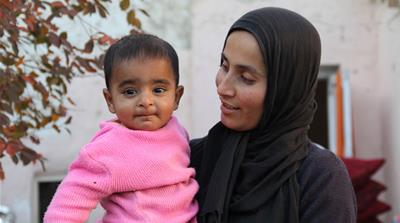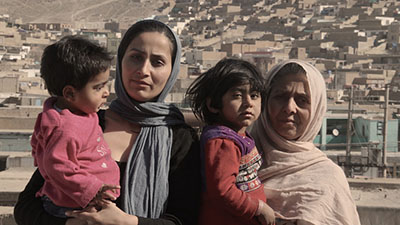"Every woman in this country has a hundred owners. It’s always been like that. Fathers, brothers, uncles, neighbours. They all believe they have the right to speak on our behalf and make decisions for us. That's why our stories are never heard but buried with us underground." - Sahra Mani Mosawi, filmmaker
But what if the stories of Afghan women were heard? What if they succeeded in fighting the cultural, familial and legal forces that strive to keep them silent? And what if the words they spoke were a demand for justice?

Khatera fears for the future of her daughter Zainab. (Photo: Al Jazeera)
Twenty-three-year-old Khatera finds out when she goes on national television to accuse her father of physically and sexually abusing her.
For 13 years, he'd raped her, resulting in numerous pregnancies. Most of them had ended abruptly when he forced her to abort, but two were carried to term.
He took one of the babies into the desert, where he left it to die.
Khatera's three-year-old daughter, Zainab, was spared that fate. But, once again pregnant by her father, she fears for the future of her daughter and unborn child if she cannot persuade the authorities to press charges against him.
It isn't the first time she has tried. The television show is a desperate attempt that she knows could have severe consequences in a country where the judicial system often incriminates the very women seeking its protection.
But being prosecuted for "moral crimes" isn't the only risk she faces in speaking out.
Khatera's uncles believe she has brought shame upon the family and that the solution lies in her death and the death of her daughter.
In the award-winning A Thousand Girls like Me, Afghan filmmaker Sahra Mani Mosawi follows Khatera as she lives in hiding, moving from house to house whenever she fears her identity might have been exposed or that her uncles might be closing in on her.
But, despite the fear, the danger and the uncertainty, she is determined to bring her father to justice, to protect herself and her children and to set an example for all other girls like her.
FILMMAKER'S VIEW
By Sahra Mani Mosawi
I am part of a society that has the highest rates of domestic violence and gender inequality in the world. I can see it. I can feel it. And I can expose it in a way that others can't.
What's important to me is to not only focus on the suffering but on how that suffering can be a rallying cry; how we, as women, are fighting for change.

Khatera lives with her mother and kids in safe houses. (Photo: Al Jazeera)
I make films to give hope to the women of my country and to give guidance to those who want to know my country better. I make films to help build a safe society for the next generation and to record our journey to that point.
Nearly every day in Afghanistan there are stories about the rape and murder of women. Some cases are covered by the media but many remain unknown.
A Thousand Girls like Me highlights the need to make the "unknown" cases known.
The Afghan legal system today is complex, confusing and corrupt. The formal state justice system is still under construction and operates only in those urban areas where there is less instability and better security - but there are fewer and fewer of those.
For three years, I was given unreserved access to the most private parts of Khatera's life and that of her family - for up to three days a week, often until late at night. The only way I could achieve this was by shooting and recording sound myself.
Gradually, Khatera, her mother and her daughter started to forget that I was even there. Through their everyday talks, their more intimate conversations and even their silences, we get an insight into the complex bond between the three of them.
Being constantly there allowed me to just let them be. I didn't ask questions. I didn't stage reality. My "cinema direct" let the narrative strength of real life take its own path. I shot long takes, in medium shots, which allowed me to keep my characters' surroundings as a constant reference in the frame, so as to never forget how deeply rooted in Afghan society these women are.
By "erasing" my presence and getting rid of all the usual shooting tricks, I had one: focusing on the most important thing - the words of these women and the message they convey, thus making it even stronger.
There were risks in shooting this documentary - for Khatera, for her mother, for her children and also for my crew and me. Danger could lurk anywhere - from within Khatera's family but also from others who view women like Khatera as the devil incarnate.
Shooting in public places, therefore, had to be done with a great sense of urgency. This helped the film, by allowing us to show just how critical it is that Khatera gets justice and how determined she is, despite the danger to her life.
I was granted exceptional permission to record sound during the trial of Khatera's father, Halim, which allowed us to hear his voice. But the film is about the consequences of his deeds, so I didn't want to show his image. He is a character in the background, a shadow over my tale. Apart from his voice, his portrait is drawn from the testimony of the three female characters.
The scenes shot in public places offer a startling visual but also a symbolic contrast with those shot in the privacy of Khatera's home.
The chaos of an overcrowded Kabul, the media attention generated by the trial, the malevolent stares of men watching one woman film another woman, the invisible but constant threat of family retaliation that forces Khatera to relocate with utter discretion - all these sequences that were shot with the required speed give way to the seeming quietness of Khatera's home, where time passes more slowly. In these moments, my shots were longer and more composed.
Being able to shoot their daily routines revealed another contrast - between the normal and the abnormal.
On the one hand, Kathera and her mother doing household chores shows their determination, for the sake of the children and also themselves, to keep things as normal as they can. But, on the other, we can hear through their voices the extraordinary - the monstrosity of the crime that binds them together.
I was given the opportunity to watch German director Helen Simon's documentary No Lullaby (Nirgendland). This film also tells the tragic tale of repeated incestuous rapes through two generations of women. I feel a strong connection with the director's approach to the issue. The emotion created by Simon's description of these harsh facts is emphasised by her own neutral stance and her use of daily life sequences as soothing intermissions.



